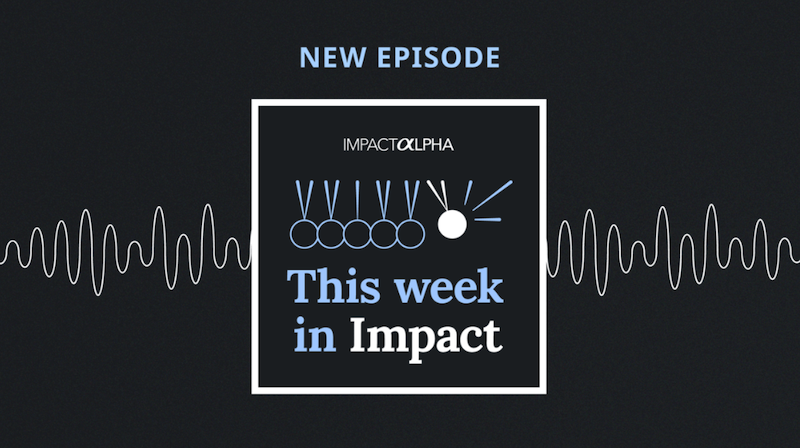ImpactAlpha, May 14 – The science was undermined. The economics were ignored. But the case for jobs and livelihoods in the wake of the COVID crash may finally succeed in driving decisive action on climate change.
Even in the first few months of the Great Pandemic, climate politics have already gone through several spin cycles. After the initial shocks of hot zones and shutdowns, many sought solace in the dramatic reduction in global carbon emissions and cleaner air – not to mention the crash of the global oil market.
In the U.S., however, early efforts to tie COVID relief to the climate action agenda ran aground in the Republican-controlled Senate. Even modest efforts, like a requirement that airlines taking bailout funds commit to long-term carbon-reduction goals, fell by the wayside.
Then the spectacle of fossil fuel companies receiving coronavirus aid spurred a backlash to the backlash, fueling an effort to at least prevent government policy from bailing out an industry in decline (see, “The carbon bubble has burst. Let’s not re-inflate it”). The Resources for Workforce Investments not Drilling, or ReWIND, act would bar CARES act fund from being used to bail out the fossil fuel industry with loans or debt relief.
To drive more proactive investment in the low-carbon transition, advocates on the left, and at least some parts of the right, are coming together to again push for support and incentives for renewable energy, as well as agriculture, forestry and water solutions that create climate resiliency. The key: call it jobs, call it infrastructure, call it good economics — just don’t call it climate action.
“In the era of COVID-19, the only way to talk about addressing the climate emergency is through the creation of sustainable jobs,” said i(x) investment’s Trevor Neilson, who is launching a Coalition for Sustainable Jobs that includes evangelicals, hunters, farmers and entrepreneurs, as well as environmentalists. “I have a lot of respect for the Green New Deal, but those words are toxic on the right.”
Pragmatic progress
Even small policy changes could provide the signals, and incentives, to unleash a wave of private investment.
A green recovery “is precisely the kind of thing that can grow the economy and transform the economy into the 21st century modern economy that we need,” Nobel-winning economist Joseph Stiglitz recently said.
Stiglitz was part of a team of high-profile economists that analyzed 700 past stimulus policies and surveyed 230 global experts to assess the potential of various stimulus measures. Their conclusion, published by London School of Economics: “Green projects create more jobs, deliver higher short-term returns per dollar spend and lead to increased long-term cost savings” compared to traditional fiscal stimulus.
For example, investment in renewable energy such as wind and solar can be enacted quickly and have a positive impact on climate. Building the infrastructure for clean energy is also labor intensive in the short term, creating twice as many jobs per dollar as fossil fuel investments, the economists note.
Here’s a brief rundown of some of the targeted strategies:
Clean infrastructure
Third Way, a self-described center-left think tank, is championing stimulus funds for ”clean” infrastructure. The authors of “Building Back Better: Investing in Clean Infrastructure to Drive Economic Recovery” offer three principles that should guide stimulus project spending: Buy American, buy clean, and buy fair. They favor giving preference to less carbon-intensive cement, steel, and other construction materials; and prioritizing companies that pay a living wage, hire local and disadvantaged workers and use materials manufactured in unionized facilities.
“Worthy” infrastructure projects include modernizing rail networks, building out electric vehicle charging infrastructure, updating the electrical grid, retrofitting buildings and factories for energy efficiency, and rebuilding transportation infrastructure to be more resilient to climate change, severe weather events and other disasters. Another idea: constructing a “CO2 transport superhighway” to lower the cost of transporting and storing captured carbon.
Many of the specific proposals target low-friction measures, such as expanding existing programs or renewing lapsed incentives to achieve green goals. In the manufacturing sector, for example, where every direct job creates four more, tax credits for clean energy facilities and matching grants for industrial energy efficiency projects could be renewed.
Sustainable Jobs
The new Sustainable Jobs Coalition has hired a Republican-leaning lobbying firm to get green jobs planks into any new stimulus bill. Those could include measures to address a nearly $12 billion maintenance backlog in national parks and other federal lands; cleaning up abandoned coal mines and creating jobs in coal regions; helping farmers augment their incomes by sequestering soil carbon; and upgrading electricity grids with energy storage technology.
“Having clean energy is a pro-life issue because we’re defending life and protecting life,” said Rev. Mitchell Hescox, who heads the Evangelical Environmental Network of about 80 Christian organizations that has collected about 70,000 signatures on a petition to create a cleaner post-COVID future. “Even the Bible talks about having fair weights. The scale has not been weighted fairly as far as energy markets go around the world.”
The coalition also includes the American Conservation Coalition, which aims to “empower conservatives to re-engage” environmental conversations; Conservation Hawks, comprised of hunters and fishers; and Stop Extinction, a group of mostly Stanford University scientists.
“We’re not looking to score any political points,” said Neilson, who also founded the Climate Emergency Fund, which is backing the new coalition. “COVID-19 is the dress rehearsal for the climate emergency. We have to do both.”
Global green deals
A green new deal is a non-starter in the U.S. Senate, but similar plans are moving ahead, fitfully, in other countries. “By using the European Green Deal as our compass, we can turn the crisis of this pandemic into an opportunity to rebuild our economies differently and make them more resilient,” European Commission president Ursula von der Leyen said last week of the €1 trillion plan.
South Korea is the latest country to embrace such a green deal. President Moon Jae-in, with a landslide legislative victory for his center-left Democratic Party, is in a position to make good on a green new deal plan released in March. The plan would make South Korea the first East Asian country to commit to net-zero emissions by 2050. Among the policy planks: an end to coal project financing and the introduction of a carbon tax.
The World Bank is warning that a lack of market reforms and supportive policies in recovery plans can put green solutions at a disadvantage to incumbent technologies. Along with short-term considerations such as job creation and lead time for projects, the bank suggests that policymakers factor in long-term goals including decarbonization, resilience and adaptive capacity, and the impact on physical, natural and human capital. It has put together a checklist for assessing sustainable recovery measures.











